There are problems with the basic assumption that people and places can be treated similarly. For example, Hewison argues that culture and commerce are not synonymous: The time has come to argue that commerce is not culture, whether we define culture as the pursuit of music, literature or the fine arts, or whether we adopt Raymond Williams’s definition of culture as ‘a whole way of life.’ You cannot get a whole way of life into a Tesco’s trolley or a V & A Enterprises shopping bag.
Some postmodern theory favours a more participatory and democratic approach to cultural development including the breaking down of barriers between culture and society, art and life, high and low culture. The process of globalisation has led to the hybridisation of different cultural forms, and decolonisation and immigration have contributed positively to the multiculturalism of the global city. However, issues pertaining to cultural integration, identity construction and representation have also been prominent in cultural studies literature over the past few decades.
The concept of culture has become increasingly politicised, especially where it is defined as a way of life of a people or society. Sarup states that: Culture is not something fixed and frozen as the traditionalists would have us believe, but a process of constant struggle as cultures interact with each other and are affected by economic, political and social factors.
Within the context of British cultural studies, for example, Stuart Hall has argued that culture is inherently political. Eagleton also emphasises the strong political dimensions of culture in terms of both conflict and identity construction, particularly in multicultural, postcolonial societies: On a global scale, the relevant conflict here is between culture as commodity and culture as identity. The high culture of Bach and Proust can hardly compete as a material force with the seductions of the culture industry, a religious icon or a national flag.


 Politics of Marketing: US Policies of Antagonization and Growing Commercial Ties with Shah
Politics of Marketing: US Policies of Antagonization and Growing Commercial Ties with Shah














































